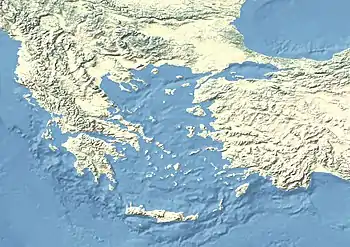Perinthus
Perinthus or Perinthos (Ancient Greek: ἡ Πέρινθος)[1][2] was a great and flourishing town of ancient Thrace, situated on the Propontis. According to John Tzetzes, it bore at an early period the name of Mygdonia (Μυγδονία). It lay 22 miles west of Selymbria, on a small peninsula[3] of the bay which bears its name, and was built like an amphitheatre, on the declivity of a hill.[4] Its site is near modern Marmara Ereğlisi, in Turkey.[5][6]

History
It was originally a Samian colony,[7] and, according to George Syncellus, was founded about 599 BC.[8] German archaeologist Theodor Panofka, however, makes it contemporary with Samothrace, that is about 1000 BC.[9] It was particularly renowned for its obstinate defence against Philip V of Macedon[10][11] At that time it appears to have been a more important and flourishing town even than Byzantium and being both a harbour and a point at which several main roads met, it was the seat of extensive commerce.[12] This circumstance explains the reason why so many of its coins are still extant from which we learn that large and celebrated festivals were held here.[9] After the fourth century AD it assumed the name of Heraclea or Heracleia (Ἡράκλεια);[13] which we find sometimes used alone, and sometimes with additions Heraclea Thraciae and Heraclea Perinthus.[12][14]
Justinian restored the old imperial palace, and the aqueducts of the city.[12] Coins of Perinthus have also survived, which were studied by Edith Schönert-Geiß.[15]
See also
References
- Ptolemy. The Geography. 3.11.6, 8.11.7.
- Xenophon, Anab. 7.2.8.
- Pliny. Naturalis Historia. 4.18.
- Diodorus Siculus. Bibliotheca historica (Historical Library). 16.76.
- Richard Talbert, ed. (2000). Barrington Atlas of the Greek and Roman World. Princeton University Press. p. 52, and directory notes accompanying.
- Lund University. Digital Atlas of the Roman Empire.
- Marcian, p. 29; Plutarch, Qu. Gr. 56
- George Syncellus, Chronicle, p. 238.
-
 Smith, William, ed. (1854–1857). "Perinthus". Dictionary of Greek and Roman Geography. London: John Murray.
Smith, William, ed. (1854–1857). "Perinthus". Dictionary of Greek and Roman Geography. London: John Murray. - Diodorus Siculus. Bibliotheca historica (Historical Library). 16.74-77.
- Plutarch Phoc. 14.
- Procopius de Aed. 4.9.
- Tzetzes, Chil. 3.812.
- Procopius, B. Vand. 1.12; Zosimus 1.62; Justin, 16.3; Eutrop. 9.15; Amm. Marc. 22.2; Itin. Ant. pp. 175, 176, 323.
- "Perinthos, Thrace - Ancient Greek Coins". Wildwinds.com. Retrieved 13 February 2019.
![]() This article incorporates text from a publication now in the public domain: Smith, William, ed. (1854–1857). "Perinthus". Dictionary of Greek and Roman Geography. London: John Murray.
This article incorporates text from a publication now in the public domain: Smith, William, ed. (1854–1857). "Perinthus". Dictionary of Greek and Roman Geography. London: John Murray.